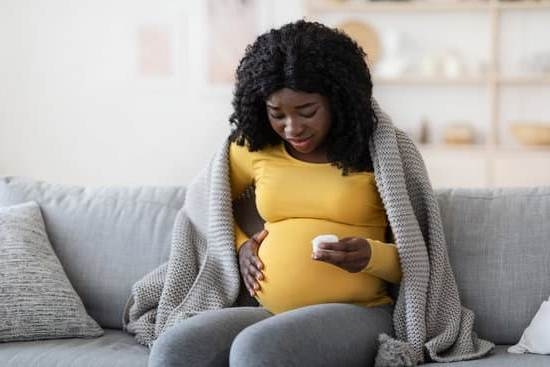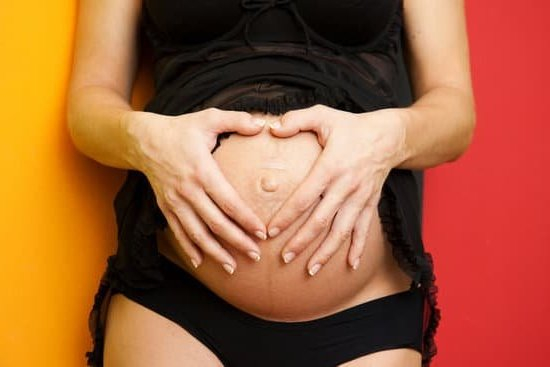Are you experiencing cramps early in your pregnancy and feeling concerned? Many women go through this experience, and it’s important to understand what it means. During the first trimester of pregnancy, a woman’s body goes through many changes, and cramping is just one of the many symptoms that can occur. In this article, we will delve into the topic of cramps early in pregnancy and provide information on how to differentiate between normal cramps and potential warning signs.
Early pregnancy brings about a range of signs and symptoms that may leave you feeling unsure or worried. In this section, we will explore the various indicators of early pregnancy and discuss what to expect during this crucial time. Whether it’s morning sickness, fatigue, or uterine cramping – understanding these symptoms is essential for any pregnant woman.
As a pregnant woman experiences physical changes in her body during the first trimester, it’s common to feel some degree of discomfort such as uterine cramping. However, it’s important to be able to differentiate between normal cramps associated with early pregnancy and those that could potentially indicate a problem. In the following sections, we will address this issue and offer guidance on how to manage and alleviate these cramps for a healthier and more comfortable pregnancy experience.
Signs and Symptoms of Early Pregnancy
Experiencing cramps in early pregnancy is a common occurrence for many women. These cramps can feel similar to menstrual cramps and may cause concern for some expecting mothers. In the first trimester of pregnancy, the body goes through a lot of changes as it prepares for the growth and development of the fetus. It is during this time that many women may experience symptoms such as nausea, fatigue, breast tenderness, and yes, cramping.
Cramping in early pregnancy is often caused by the uterus expanding and stretching to accommodate the growing embryo. This can cause mild to moderate discomfort in the lower abdomen. Additionally, hormonal changes can also contribute to cramping during early pregnancy. However, it’s important to note that severe or persistent cramping accompanied by heavy bleeding could be a sign of a more serious condition such as an ectopic pregnancy or miscarriage.
Understanding the signs and symptoms of early pregnancy, including cramps, can help expecting mothers navigate this delicate time with greater ease. Knowing what to expect and how to differentiate between normal discomfort and potential warning signs is crucial for ensuring a healthy and comfortable early pregnancy experience.
| Cramps Early Pregnancy Information | Details |
|---|---|
| Common causes of cramping | Uterus expansion, hormonal changes |
| Potential warning signs | Severe or persistent cramping with heavy bleeding |
What Are Cramps in Early Pregnancy?
Cramps in early pregnancy can be a source of concern and anxiety for many women. As the body undergoes significant changes to accommodate the growing fetus, it is not uncommon to experience cramping during the first trimester. These cramps are often caused by the uterus expanding and the ligaments stretching to make room for the developing baby. Additionally, hormonal changes and increased blood flow to the pelvic area can also contribute to these discomforts.
The sensation of cramping in early pregnancy is often likened to menstrual cramps, with mild to moderate intensity. Some women may also experience a dull ache or sharp pains in the lower abdomen, similar to what is felt during ovulation. It is important for women to recognize that these cramps are usually a normal part of early pregnancy, as their body adjusts to the changes taking place.
It is worth noting that every woman’s experience with cramps in early pregnancy can vary. While some may feel minimal discomfort, others may find the cramping more pronounced. It is essential for expectant mothers to understand that experiencing cramps early in pregnancy is not necessarily an indication of a problem. However, being able to differentiate between normal cramps and potential warning signs is crucial for peace of mind and proper care.
Differentiating Between Normal Cramps and Potential Warning Signs
During the early stages of pregnancy, it is common for women to experience cramps. These cramps are often a result of the changes happening in the body as it prepares for the growth and development of the baby. However, it is important to be able to differentiate between normal cramps and potential warning signs that may indicate a problem with the pregnancy.
Normal cramps in early pregnancy are usually mild and feel similar to menstrual cramps. They may occur as the embryo implants into the uterine lining or as the uterus expands to accommodate the growing fetus. These cramps are typically nothing to worry about and are considered a normal part of early pregnancy.
On the other hand, experiencing severe or intense cramping, especially if accompanied by heavy bleeding, could be a potential warning sign of an ectopic pregnancy or miscarriage. Ectopic pregnancies occur when the fertilized egg implants outside of the uterus, usually in one of the fallopian tubes, and can be life-threatening if not treated promptly. Miscarriages, on the other hand, involve the loss of a pregnancy before 20 weeks gestation and can also present with severe cramping and heavy bleeding.
To help differentiate between normal cramps and potential warning signs, it is important for pregnant women to pay attention to their bodies and seek medical attention if they experience any concerning symptoms. Regular prenatal visits with healthcare providers can also help monitor for any complications or issues during early pregnancy.
- Milder cramping that feels similar to menstrual cramps
- Occurs as embryo implants or uterus expands
- Considered normal part of early pregnancy
- Severe cramping accompanied by heavy bleeding
- Potential warning signs of ectopic pregnancy or miscarriage
- Regular prenatal visits can help monitor for complications
Managing and Alleviating Cramps in Early Pregnancy
Stay Hydrated
One of the best ways to manage and alleviate cramps in early pregnancy is by staying well-hydrated. Dehydration can contribute to muscle cramping, so it’s important to drink plenty of water throughout the day. Aim for at least 8-10 glasses of water daily, and consider adding electrolyte-rich beverages or foods to your diet to help maintain proper hydration levels.
Practice Gentle Exercise
Engaging in gentle exercise such as walking or prenatal yoga can help alleviate cramps in early pregnancy. Physical activity can improve circulation and reduce muscle tension, which may help relieve cramping. However, be sure to consult with your healthcare provider before starting any new exercise routine during pregnancy.
Use Heat Therapy
Applying heat to the lower abdomen can provide relief from cramps in early pregnancy. A warm compress or a heating pad on a low setting can help relax the muscles and alleviate discomfort. It is important to be cautious with the use of heat therapy during pregnancy, so be sure to follow safety guidelines and never apply heat directly to the abdomen for extended periods.
By following these tips, you can effectively manage and alleviate cramps in early pregnancy, helping you stay comfortable as your body goes through the changes of growing a baby.
Real-Life Experiences: Women’s Stories and Experiences With Cramps in Early Pregnancy
In this next section, we will hear from real women who have experienced cramps during early pregnancy. Their stories will provide insight into how different individuals have managed and coped with this common symptom.
When to Seek Medical Attention for Cramps in Early Pregnancy
During the early stages of pregnancy, it is common for women to experience cramps. These cramps can be worrying and may lead some women to wonder whether or not they should seek medical attention. In most cases, cramps in early pregnancy are completely normal and are simply a result of the changes occurring in the body as it prepares for pregnancy. However, there are certain instances where seeking medical attention is necessary.
If the cramps you are experiencing are severe and accompanied by heavy bleeding, it is important to seek medical attention immediately. This could be a sign of a potential miscarriage or ectopic pregnancy, both of which require immediate medical intervention. Additionally, if the cramping is persistent and not alleviated by rest or over-the-counter pain medication, it is recommended to consult with a healthcare professional.
Another instance where seeking medical attention is crucial is if the cramps are accompanied by other symptoms such as fever, chills, dizziness, or fainting. These could indicate an underlying health issue that needs to be addressed by a healthcare provider. It’s always better to err on the side of caution and seek guidance from a medical professional if you have any concerns about the cramps you are experiencing during early pregnancy.
Tips for a Healthy and Comfortable Early Pregnancy
During the early stages of pregnancy, it is crucial for women to take proactive steps to ensure their health and comfort. Here are some tips for a healthy and comfortable early pregnancy:
- Maintain a Balanced Diet: Eating a well-balanced diet that is rich in essential nutrients such as folic acid, iron, calcium, and omega-3 fatty acids is crucial during early pregnancy. This can help support the developing fetus and alleviate symptoms such as nausea and fatigue.
- Stay Hydrated: Adequate hydration is important for pregnant women as it helps support the increased blood volume and amniotic fluid production. It can also help reduce the frequency of cramps during early pregnancy.
- Get Sufficient Rest: Fatigue is a common symptom during early pregnancy, so getting enough rest is essential. It’s important to listen to your body and prioritize sleep by taking naps or going to bed earlier.
Moreover, here are additional tips for ensuring a healthy and comfortable early pregnancy:
- Engage in Gentle Exercise: Regular physical activity during early pregnancy can help alleviate cramps, improve circulation, and reduce stress levels. It’s important to consult with a healthcare provider before starting any exercise routine.
- Manage Stress: High stress levels can exacerbate symptoms such as cramps in early pregnancy. Engaging in relaxation techniques such as deep breathing, prenatal yoga, or meditation can be beneficial for both the mother and the baby.
By incorporating these tips into your daily routine, you can enhance your overall well-being during the early stages of pregnancy while managing discomforts such as cramps effectively.
Real-Life Experiences
When it comes to early pregnancy, many women experience a wide range of symptoms, and cramps are often reported as one of the most common. These cramps in early pregnancy can be worrying for expectant mothers, but it’s important to understand that they can be a normal part of the body’s adjustments during this time.
In this section, we’ll delve into real-life experiences from women who have gone through cramps in early pregnancy and how they navigated this symptom.
The Rollercoaster Ride of Emotions
During early pregnancy, women often go through a rollercoaster of emotions, and experiencing cramps can heighten their anxiety. Many women describe feeling scared and confused when they first notice cramping, especially if they were not aware that it could be a normal part of early pregnancy. Hearing about other women’s experiences with cramps during this time can provide much-needed reassurance and support.
Coping Mechanisms and Tips
In sharing their stories, some women have also highlighted coping mechanisms and tips for managing cramps in early pregnancy. For example, gentle exercises such as walking or yoga have been recommended by some to help alleviate the discomfort associated with cramping. Additionally, staying well-hydrated and getting plenty of rest are also common suggestions from those who have experienced cramps during their early pregnancy.
Seeking Support
Many women who have experienced cramps in early pregnancy emphasize the importance of seeking support from healthcare providers or other pregnant women who have gone through similar experiences. Some mention that talking to their doctors helped ease their worries while others found comfort in connecting with friends or family members who had been through pregnancies themselves.
Overall, these real-life experiences shed light on the different ways women navigate and manage cramps during this delicate stage of their journey to motherhood.
Conclusion
In conclusion, experiencing cramps in early pregnancy is a common occurrence for many women. It can be attributed to the changing and stretching of the uterus as the body prepares for the growth of the baby. While cramps can cause discomfort and worry, it is important to understand that they are typically a normal part of early pregnancy. However, it is crucial to differentiate between normal cramps and potential warning signs that may indicate a more serious issue.
Taking care of yourself during early pregnancy means being aware of your body and its changes. If you experience cramps, it is important to manage and alleviate them through rest, hydration, and gentle exercise. It is also beneficial to seek guidance from healthcare providers on safe pain relief options during pregnancy. Additionally, maintaining a healthy diet and regular prenatal care can contribute to a comfortable and thriving pregnancy.
Lastly, every woman’s experience with early pregnancy, including the presence of cramps, will vary. Sharing stories and experiences with other women who have gone through similar situations can provide emotional support and reassurance. While some women may have mild discomfort from cramps, others may find it more challenging. By taking care of yourself physically and emotionally, you can help ensure a healthy and comfortable early pregnancy journey despite experiencing cramps or other symptoms associated with this phase of motherhood.
Frequently Asked Questions
What Does Early Pregnancy Cramps Feel Like?
Early pregnancy cramps can feel similar to menstrual cramps, often described as a dull, aching sensation in the lower abdomen. Some women may also experience sharp, stabbing pains or a feeling of pressure.
How Long Should Early Pregnancy Cramps Last?
Early pregnancy cramps should typically only last for a few days at most. It’s important to note that every woman’s body is different, so the duration of cramps can vary. If the cramps persist or become severe, it’s best to consult with a healthcare provider.
Is It Normal to Have Period Like Pain in Early Pregnancy?
It is actually quite common for women to experience period-like pain in early pregnancy. This can be caused by the uterus expanding and stretching as the embryo implants itself in the uterus lining.
However, if the pain is severe or accompanied by heavy bleeding, it’s important to seek medical advice as it could be a sign of complications such as an ectopic pregnancy or miscarriage.

Welcome to my fertility blog. This is a space where I will be sharing my experiences as I navigate through the world of fertility treatments, as well as provide information and resources about fertility and pregnancy.





